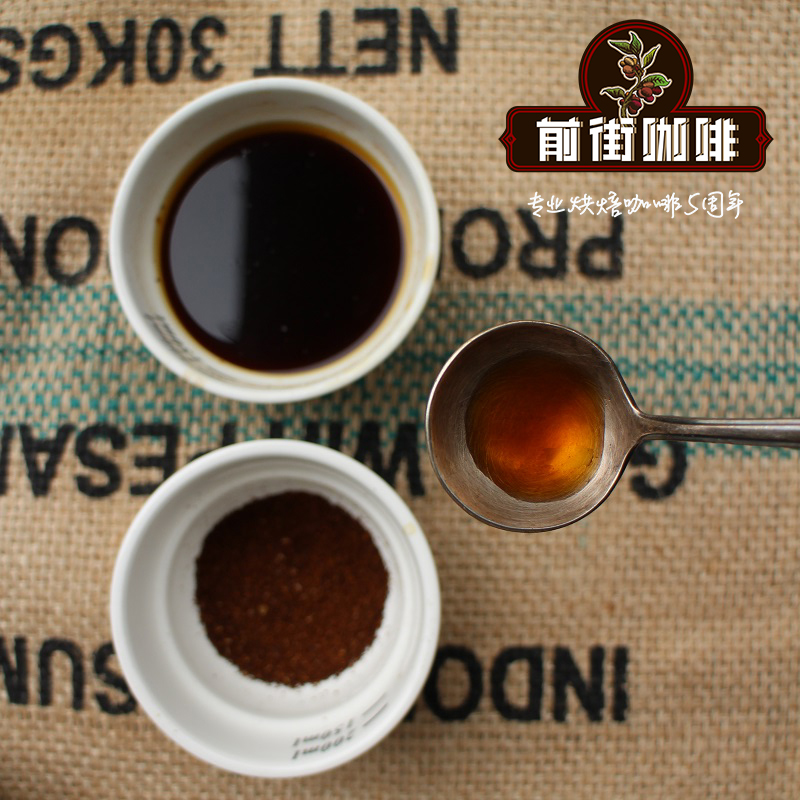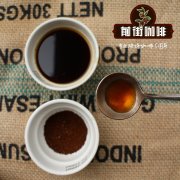Coffee extraction Italian coffee extraction standard coffee over-extraction

Professional coffee knowledge exchange more coffee bean information please follow the coffee workshop (Wechat official account cafe_style)
Extraction may be the most important aspect of coffee brewing, but it is also one of the least understood by baristas. Extraction is everything. Without extraction, you can't even taste a cup of coffee.
Coffee extraction is the simplest but not 100% accurate definition: coffee extraction is the process by which water dissolves the substance in coffee powder.
It seems very easy to sum up, but it is not so easy to understand and use.
When coffee powder is mixed with water, many changes will take place. Among them, water will dissolve a lot of flavor substances in coffee, which make up almost all the taste sensations of a cup of coffee. The rest is some insoluble substances, mainly composed of some very small coffee powder, which will affect the taste of the coffee. But these insoluble substances cannot be counted as part of the extraction because they are only suspended in water.
About 28% (by weight) of cooked coffee beans are soluble in water. This means that you can extract up to 28% of the coffee's weight, and the rest is basically cellulose and other plant ingredients that make up the coffee bean.
Water is very good at dissolving these soluble chemicals, but it also needs some help. To help the water, you need to increase the surface area of the coffee beans and open the "pathway" to make it easier for the water to bring out flavor substances. This can be easily achieved with a bean grinder, which crushes the coffee beans, doubling the surface area of the coffee beans so that the water can work better.
Ideally, grind the coffee beans into very fine coffee powder particles and let the water come into contact with them to dissolve all the beautiful flavor substances. Unfortunately, however, the end result is often an unbearably bitter cup of coffee. This is because not all flavor substances in coffee are good, so when making coffee, you need to control the amount of flavor substances extracted to get a "delicious" cup of coffee.
It is not feasible to avoid the bad taste caused by excessive extraction by increasing the amount of powder and extracting only the front segment. Underextracted coffee tastes just as bad.
Many people understand extraction as a two-way road connecting excessive extraction with insufficient extraction. On this road, always try to control coffee extraction in the middle, to avoid excessive or insufficient extraction.
Insufficient extraction (Under-extractedCoffee)
Insufficient extraction means that the coffee powder does not dissolve enough flavor substances, and there are still a large number of substances that have not been extracted, which could have neutralized the bad flavor substances.
Think back to the Espresso you used to drink with too short extraction time, such as a cup of coffee made from popular boutique coffee beans with Italian roasting, its irritating sour, lack of sweetness, weird saltiness and disappointing short aftertaste-these four characteristics are the most obvious signs of inadequate extraction.
Acidity (sourness)
Sourness is a subtle presence, especially when we are always looking for good acidity in coffee. Many people ask, "aren't sourness and acidity the same thing?" This question is also reasonable, because in many languages, "sourness" and "acidity" are the same word "sour". You can imagine that such a situation will make multilingual cup testing a little inconvenient.
In order to distinguish, "sourness" is usually defined as negative. Sourness is a very quick and intense feeling. It will quickly cause you to have a physical reaction, you will suck up your lips, and there will be strong and sharp sensations on both sides of the tongue. Sourness is an unpleasant bad taste.
Whenever acidity is discussed, it may be good or bad. More appropriately, it is a flavor category that contains both positive and negative attributes. For example, "that cup of coffee is very sour" (Thatcoffee'sacidityisdelightful) and "that cup of coffee is very sour" (Thatcoffee'sacidityisverysour) both make sense to me. Acid (Acidity) contains sharp acid (sour) / fruit juice acid (juicy) / bright acid (bright) / irritating acid (tart) and so on.
Lack of sweetness (LackingSweetness)
One of the most important aspects of coffee flavor is its sweetness. Sweetness is the secret meaning. Have you ever heard someone complain that "this espresso is too sweet"? You can think about it. Insufficient extraction is not sweet, and it is far from it. Insufficient extraction will always leave some emptiness that makes you feel insatiable, and after a drink, you will feel "far from enough". One of the benefits of a lack of sweetness is that it makes sourness more obvious, making the extraction deficiency easier to identify.
Salty (Salty)
Many people may not agree with this view, but underextracted coffee is salty. This kind of salty is not the kind of "I'm sorry I accidentally put salt". Underextracted coffee always brings salty touch / taste. From the oral tactile point of view, this salty and alkaline solvent will bring a similar sense of slippery. Never try ammonia to prove this. Just trust me)
Short aftertaste (QuickFinish)
The aftertaste of a reasonably extracted cup of coffee lasts for minutes (or even hours, if you're lucky). This aftertaste is the same as you just ate a piece of black sugar, or just ate a piece of taffy, very delicious!
A cup of underextracted coffee does not provide this aftertaste. When you swallow, everything will disappear, and you won't feel much of a pleasant aftertaste. After drinking coffee, such an abrupt end, unfinished experience, is really not so delicious.
There are other flavor performances that also suggest inadequate extraction, but the above four aspects are the most significant. When you taste these four flavors, you can be sure that your coffee is underextracted.
Excessive extraction (Over-extractedCoffee)
Excessive extraction refers to the dissolution of too many soluble flavor substances. This extraction state will bring some bad flavor.
Try to think back to the Espresso made of roasted beans in a popular boutique coffee with an extraction time of 40-50 seconds. Such Espresso is bitter, dry and hollow-these three flavors are the three most obvious characteristics of overextraction.
Bitter (Bitter)
Everyone knows that coffee is bitter. Coffee that is overextracted is extremely bitter. Unless you are drinking Campari, you really don't want to taste so much bitterness. The bitterness in coffee mainly comes from caffeine, but there are many other chemicals that affect the bitterness. The chemical changes of deep-baked beans have entered the stage of dry distillation and will contain more bitter chemicals.
Dry (Drying)
Coffee with a sense of dryness is extremely bad because dryness is a very strong feeling and lasts for a long time. This feeling, also known as "Astringency", can also be experienced in unsweetened black tea, short-aged red wine or white wine that has been stored for too long. In wine, astringency is mainly caused by polyphenols (widely found in plants, seeds and bark, etc.). There are similar chemicals in coffee that can cause astringency.
Polyphenols are bitter, and they bind to proteins in saliva. Generally speaking, this combination reduces the lubrication of the tongue and creates a rough, dry feeling in your mouth (this feeling should not be associated with "crisp" and "dry" in wine, which mean bright acidity and low sweetness in wine, not taste).
Empty and boring (HollowandEmpty)
Over-extracted coffee tastes empty and lifeless, and it feels like you squeeze everything out, but it also destroys everything in the process.
Properly extracted coffee will fill your mouth with a thick feeling, it is delicious, smooth, and more importantly, it is rich. Under-extracted coffee is empty, boring, rough and hard to swallow, and it is so lacking in flavor and characteristics (not specifically referring to a particular flavor).
These are the typical flavor characteristics of over-extracted coffee. Of course, these are not the only flavor characteristics of over-extracted coffee, but these are the easiest to identify. You should be able to tell when you drink a cup of over-extracted coffee!
Important Notice :
前街咖啡 FrontStreet Coffee has moved to new addredd:
FrontStreet Coffee Address: 315,Donghua East Road,GuangZhou
Tel:020 38364473
- Prev

How does the flavor and aroma of coffee describe where the aroma of coffee comes from?
Professional coffee knowledge exchange more coffee bean information please follow the coffee workshop (Wechat official account cafe_style) do you drink coffee in large gulps, or do you cool it before entering it? Drink it all in one breath? Did you know that smell is as important as taste when drinking coffee? The taste of coffee is ever-changing. Feeling the characteristics of it is the pleasure of drinking coffee. Let's experience the layer of coffee taste together.
- Next

What is the difference between two lakes, Shuangman and Shuangman Manning?
Professional coffee knowledge exchange more coffee bean information please follow the coffee workshop (Wechat official account cafe_style) 16961699 Dutch East India Company transplanted Ceylon iron truck to Java to start the coffee planting industry in Indonesia. In 1835 Dutch merchant ships transported iron pickups from Java (Java has the same name as a programming language whose logo is a coffee cup).
Related
- Beginners will see the "Coffee pull flower" guide!
- What is the difference between ice blog purified milk and ordinary milk coffee?
- Why is the Philippines the largest producer of crops in Liberia?
- For coffee extraction, should the fine powder be retained?
- How does extracted espresso fill pressed powder? How much strength does it take to press the powder?
- How to make jasmine cold extract coffee? Is the jasmine + latte good?
- Will this little toy really make the coffee taste better? How does Lily Drip affect coffee extraction?
- Will the action of slapping the filter cup also affect coffee extraction?
- What's the difference between powder-to-water ratio and powder-to-liquid ratio?
- What is the Ethiopian local species? What does it have to do with Heirloom native species?

